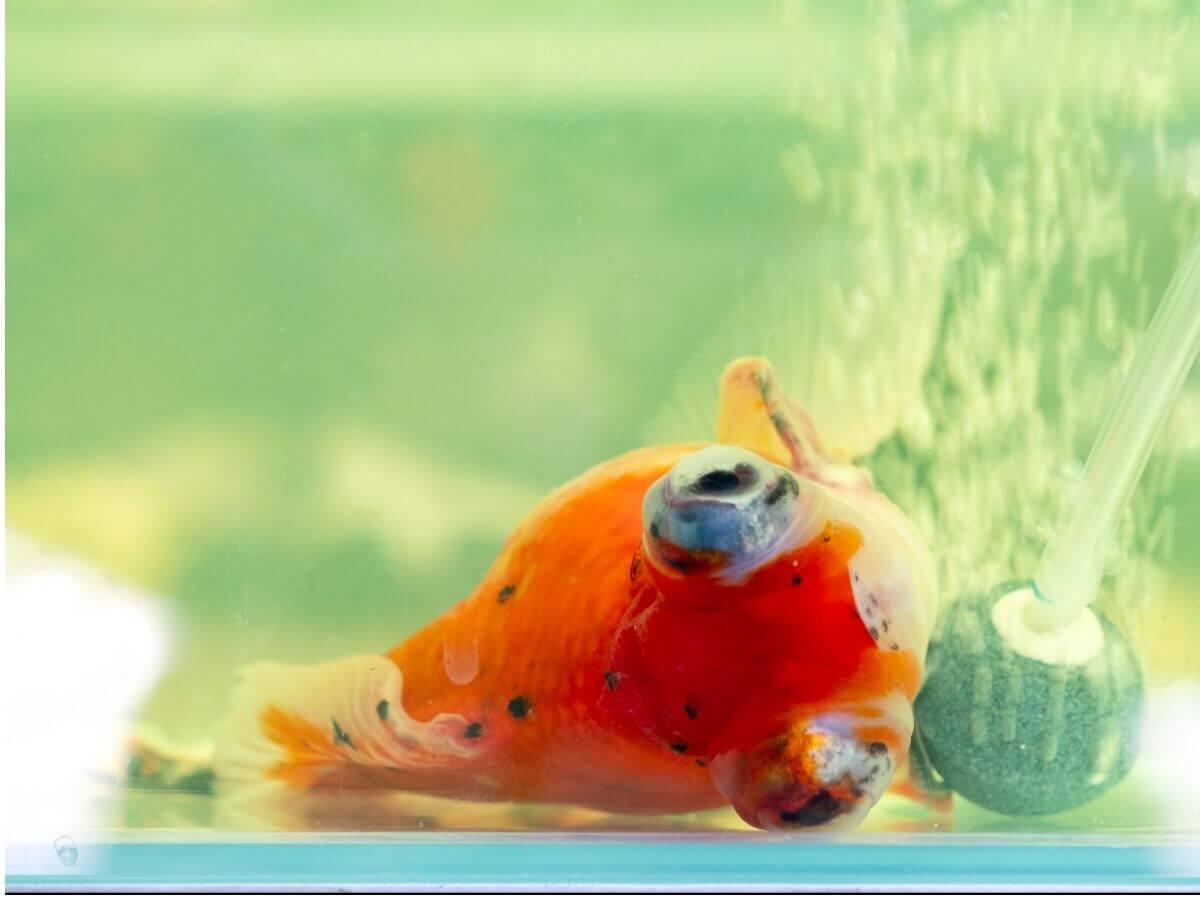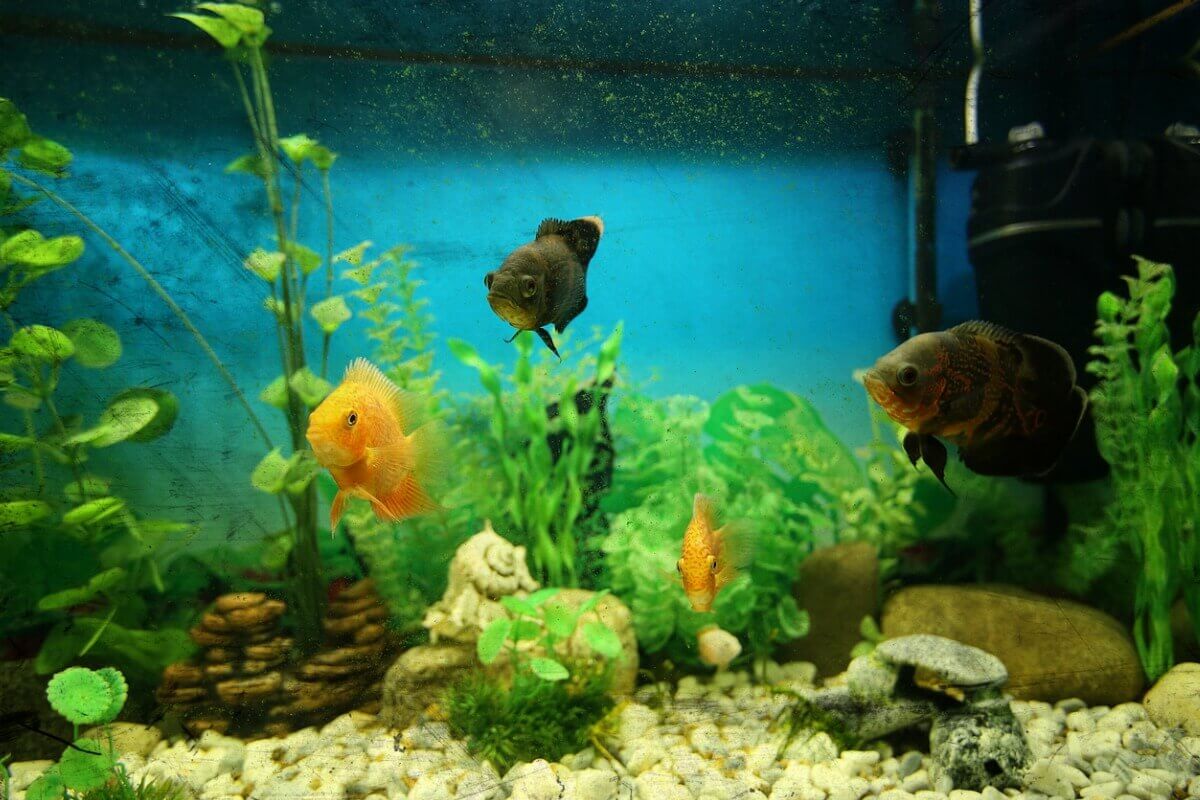My Aquarium Smells Bad: What's the Cause?


Written and verified by the biologist Samuel Sanchez
Aquariums are an excellent decorative element and a great way to learn about aquatic life. Not only do they look beautiful in your home or office with their natural tones, but they teach the owner how an ecosystem works in nature and the variables it requires to achieve balance. However, if your aquarium smells bad or looks dirty, the experience is completely ruined.
It’s common for first-time owners in the aquarium industry to find themselves facing great challenges when maintaining their tank: Foam on the surface, cloudy water, bad odors, the death of their fish, inadequate water values, and many other things. Here, we’ll show you the reasons why your aquarium can smell bad and tell you what you can do to get rid of the stink.
Why does my aquarium smell bad?
It’s normal for aquariums to smell “moist” (as redundant as that sounds), as they’re a body of water that’s constantly evaporating, and that increases the relative humidity of the immediate environment. It’s also common to notice some aromas like that of fresh fish or mud, depending on the substrate your use and the number of specimens that are housed in the tank.
However, in some cases, the odor may be fetid or too unpleasant to be considered normal. Below, we’ll show you some of the causes of this and how to solve the problem.
1. There’s a dead fish in the tank
When fish die, their swim bladder (the organ responsible for gas exchange for movement in the water column) empties itself of gases, which causes them to go to the bottom of the tank. However, as their body breaks down, the bacteria inside it synthesize many more gases, causing the deceased animal to rise to the surface.
The decomposition of the animal and its proximity to the surface of the tank cause the aquarium to be flooded with a foul odor, something similar to a rotten egg. So, search the entire aquarium for the dead specimen and remove it as soon as possible. You can also make a 20% water replacement, as this event may have caused slight chemical imbalances in the environment.

2. Excessive feeding
Overfeeding is one of the most common problems in aquariums for first-time tutors. Upon seeing so many specimens in the tank, it’s common to think that they consume large amounts of food. Nothing could be further from the truth, as most exotic species are very small and have a small intestinal system.
Almost all fish are satisfied with 1-2 meals a day at most. Before you start feeding them, check with the pet store owner how many flakes or pellets of dry product are suitable according to the number of fish in your aquarium. You can also choose live food from time to time (such as brine shrimp), as it takes longer to decompose.
Excess food decomposes in the substrate, so it’s one of the reasons why your aquarium smells bad.
3. Plant rot
Having an aquarium with plants is quite a challenge. Plantlife adds a lot of color and stimulation to the fish in the tank, but it can also rot and create a bad smell if it’s not cared for well. In addition, the presence of these organic agents usually favors the appearance of some types of algae.
To avoid this situation, make sure that the tank substrate is suitable for the plant species you’re going to introduce into it and cycle it a month or 2 before introducing the fish. You can also buy products (liquid compost) that nourish the aquarium plants without harming the fish.
4. Blocking of the filters
All aquariums must have a filter in constant operation. Otherwise the water stagnates and the fish die in a short time. You must wash the filter components and replace some materials (such as the sponge and activated carbon) at least once a month to avoid losing efficiency.
If you don’t carry out this routinely, a dead fish, bits of plants, or sand debris could end up clogging the filter pump and preventing it from working properly. It’s also possible that the mechanism has broken and it’s time to buy a new one.
Always buy a filter suitable for the size and number of members of your aquarium.
5. Overpopulation
Fish defecate at least every 48 hours, although this value is highly dependent on the species. If your aquarium smells bad and is overcrowded, the question will answer itself: Feces accumulate in the substrate, bacteria are overgrown, and the smell of decomposition appears. It’s also common for the water to become cloudy in these cases.
To avoid overpopulation, always inform yourself about the amount of water that each species requires. For example, for each guppy fish that you add to an aquarium, there must be 5 more liters of water, while the golden carp or goldfish requires 40 liters per specimen.
6. Water conditions
Although this is one of the less common causes that may explain why your aquarium smells bad, you must never rule out that the water itself could be the dirty agent before entering the tank. Check the pipes in your home well, as well as the color of the liquid when it comes out of the tap. You may be in for a nasty surprise.
7. Lack of cleanliness
Sometimes, all the conditions in the aquarium are just right and it still smells bad. In this case, ask yourself how often you change the water and what hygiene routine you follow with your tank. In the following list, we’ll show you the central points in this regard:
- You have to change 10-15% of water weekly or 30% every 2 weeks. Remember that the new water must be chlorine-free and pre-conditioned for the fish.
- You need to wash the filter material every 15 days and change the sponges once a month.
- Every time the water is changed, you need to siphon the substrate and remove the organic matter from the bottom.
- If you have plants in your aquarium, it’s a good idea to clean the glass every week with special instruments to avoid the overgrowth of algae.

As you can see, if your aquarium smells bad, something’s when it comes to hygiene or fish survival. Follow all the recommendations that we’ve shown you and you’re sure to find the reason for this unpleasant event. Fortunately, it’s not difficult to reverse it.
All cited sources were thoroughly reviewed by our team to ensure their quality, reliability, currency, and validity. The bibliography of this article was considered reliable and of academic or scientific accuracy.
- Romero, J., Ringø, E., & Merrifield, D. L. (2014). The gut microbiota of fish. Aquaculture nutrition: Gut health, probiotics and prebiotics, 75-100.
- 7 Reasons Why Your Fish Tank Stinks (And how to fix it!), Fish Lab. Recogido a 16 de septiembre en https://fishlab.com/fish-tank-smells-bad/
- How to treat smelly aquarium water, The spruce Pets. Recogido a 16 de septiembre en https://www.thesprucepets.com/stinky-aquarium-water-1381889
This text is provided for informational purposes only and does not replace consultation with a professional. If in doubt, consult your specialist.